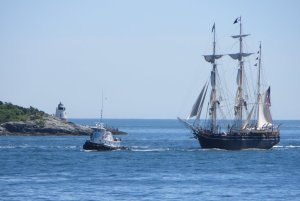Standing in a room strewn with a backpack, notebook, Ipad and clothes I’m little more than a hour from driving to Provincetown to go sailing (yes, the first hint that your writer is a procrastinator). Why Provincetown and why to sail? It’s fair to say I am not, in the words of the Harvard historian Samuel Morrison, an “adventure-loving youth” seeking “an easy escape from the strict conventions and prying busybodies of New England towns.” Nor am I one of the pirates who, as Marcus Redicker so wonderfully describes, is seeking an alternative social order by going to sea. And I do not believe, as Henry Dana did, I will “cure, if possible … a weakness of the eyes” by hard work at sea. Actually, it is more likely I will get sea sick than cure any illness I have. Neither an adventurer, radical or cure-seeker am I. I am instead a quite ordinary academic, normally desk-bound and with a wife who probably has more than a few quibbles about her “old man” going to sea.
So if not for the romance, the desire or need to seek a new life or to find a cure for my physical ailments why is it that I leave the comfort of my Brooklyn home for the choppy waters of Boston Bay? In short, the opportunity of a lifetime; to sail on Mystic Seaport’s Charles W. Morgan, America’s oldest whaling ship.
The Charles W. Morgan is back at sea after a major retrofit. Sailing out into the Atlantic it has for the first time in more than seventy years unfurled its sails in open waters. As part of Mystic Seaport’s 38th Voyager Program (this is the 38th voyage of the Charles W. Morgan ) the Seaport has, with support from NEH and other funders, embarked on one of this nation’s largest public history projects; taking 79 artists, writers, historians, film makers, archeologists, literary scholars and scientists aboard the whaling ship for a series of voyages. And I am one of these fortunate few who will be sailing on the whaling ship.
Over the coming weeks and months I will regularly post blogs regarding my time, albeit short, on the Charles W. Morgan, with the intention of connecting my experiences to those of the men I write about; 18th century black mariners. I hope to create a conversation about the central role of black mariners in America’s Age of Sail and in doing so “uncover hidden lives.” In doing so, I will focus much of my attention to the lives of individual black mariners. My posts will utilize my Black Mariner Database , a dataset of more than 25,000 18th century black mariners and maritime fugitives, to provide individual case stories to bring alive some of the issues (race at sea, opportunities for freedom, how serving on different types of ships shaped the lives of black mariners, etc.) I’ll be discussing.
I look forward to your comments.


Looking forward to hearing about the experience, especially how it might shift your understanding of the black mariner’s experiences.
LikeLike
So glad to learn of your blog and eager to read subsequent installments.
LikeLike
Across the pond ships are called ‘she’, not it. I am sure you will have discovered due and proper respect for your new albeit temporary female partner by the time you left her.
Charlie (the other)
LikeLike
I’ve fallen in love with The Charles W. Morgan; what a fabulous female partner she is!
LikeLike